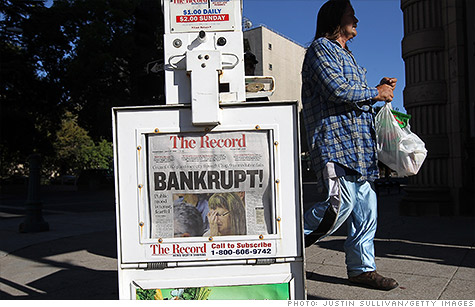Search News

Stockon was the first in a string of California bankruptcies.
NEW YORK (CNNMoney) -- San Bernardino became the third California city to file for bankruptcy in the past few weeks ... but it won't be the last.
Many municipalities in the Golden State and around the nation are struggling to cover their costs as the economic malaise continues to hurt tax revenue streams, experts said. This will lead to more municipal bankruptcies, which have been rare until now.
"This is not the end. This is the beginning," said Peter Navarro, business professor at University of California, Irvine. "As cities see it can be done and is being done, it will give them the idea to do it."
The San Bernardino City Council voted Tuesday to file for Chapter 9 bankruptcy after the interim city manager issued a report that outlined its dire straits. Some $10 million to $16 million in annual revenue has evaporated in recent years as taxable sales dried up and property values plummeted.
Despite negotiating tens of millions of dollars in concessions and reducing its workforce by 20% over the past four years, San Bernardino was facing insolvency and would not have enough cash on hand to meet its obligations, according to the report.
"The city has reached a breaking point," the report said, noting the municipality of 211,000 residents was facing a $45 million shortfall.
San Bernardino's bankruptcy decision comes only days after filings by Mammoth Lakes and Stockton in California. These are the first bankruptcies in the state since Vallejo filed in 2008.
Mammoth Lakes sought protection on July 2 after a property developer won a $43 million court judgment against the resort town of just over 8,000 residents. Experts say this filing should not be lumped in with the other two California towns since it was an unusual circumstance.
Stockton, however, filed for bankruptcy in late June after three months of mediation with creditors failed to close a $26 million budget shortfall. The city of 292,000 residents had already addressed $90 million in deficits over the past three years, mainly through reducing services and employee compensation.
"This is what we must do to get our fiscal house in order and protect the safety and welfare of our citizens," said Mayor Ann Johnston in a press release announcing the filing. "We will emerge from bankruptcy with a solid financial future."
Both Stockton's and San Bernardino's fiscal troubles are due in large part to the massive housing downturn and recession that swept across California. Both towns were hit particularly hard by the foreclosure crisis, which left lots of abandoned homes and reduced property values in its wake. That translated into lower property tax revenues, which are critical to supporting public services.
Also, municipalities have also struggled from budget changes made on the state level. Suffering from their own massive budget shortfalls, Governor Jerry Brown and the state legislature made changes to vehicle tax money and redevelopment agencies that stripped locales of hundreds of millions of state funding.
While some areas of the Golden State are starting to recover, the regions containing those two towns are not, said Chris McKenna, executive director of the League of California Cities.
By filing for bankruptcy, cities will be able to keep police and firefighters on the street and possibly keep some parks and libraries open while they work out their finances, he said.
More municipal bankruptcies are likely in California and throughout the nation, as cities continue to battle rising costs and a weak economy, said Eric Hoffman, an analyst at Moody's.
Still, "we don't expect it to be widespread," he said.
There are 19,000 city governments in the U.S. and the number of bankruptcies will likely number in the 10s, said Chris Hoene, research director at the National League of Cities. Though that's more than the nation has seen in previous downturns, he doesn't think it's the start of a major crisis.
That's not to say that the residents and workers in the bankrupt towns won't feel the pain. They will likely suffer from reduced services and their employees will likely find they have to pay more into their pension and health funds, if they are lucky enough to keep their jobs.
As for the impact on municipal bond investors, the experts are divided.
Navarro, the professor, said a wave of bankruptcies will likely spook the market and make it harder and more costly for cities to issue bonds. But Hoene noted that in bondholders and creditors have been protected in many bankruptcies over the past 30 years.
However, most cities are either passing through or over the worst of the economic downturn and should start recovering in the near future, Hoene said. Sales taxes, for instance, are recovering in some locales.
The bankruptcies are "a sign of short-term strife," he said. "But it's also a sign they've hit bottom." ![]()
| Overnight Avg Rate | Latest | Change | Last Week |
|---|---|---|---|
| 30 yr fixed | 3.80% | 3.88% | |
| 15 yr fixed | 3.20% | 3.23% | |
| 5/1 ARM | 3.84% | 3.88% | |
| 30 yr refi | 3.82% | 3.93% | |
| 15 yr refi | 3.20% | 3.23% |
Today's featured rates:
| Latest Report | Next Update |
|---|---|
| Home prices | Aug 28 |
| Consumer confidence | Aug 28 |
| GDP | Aug 29 |
| Manufacturing (ISM) | Sept 4 |
| Jobs | Sept 7 |
| Inflation (CPI) | Sept 14 |
| Retail sales | Sept 14 |